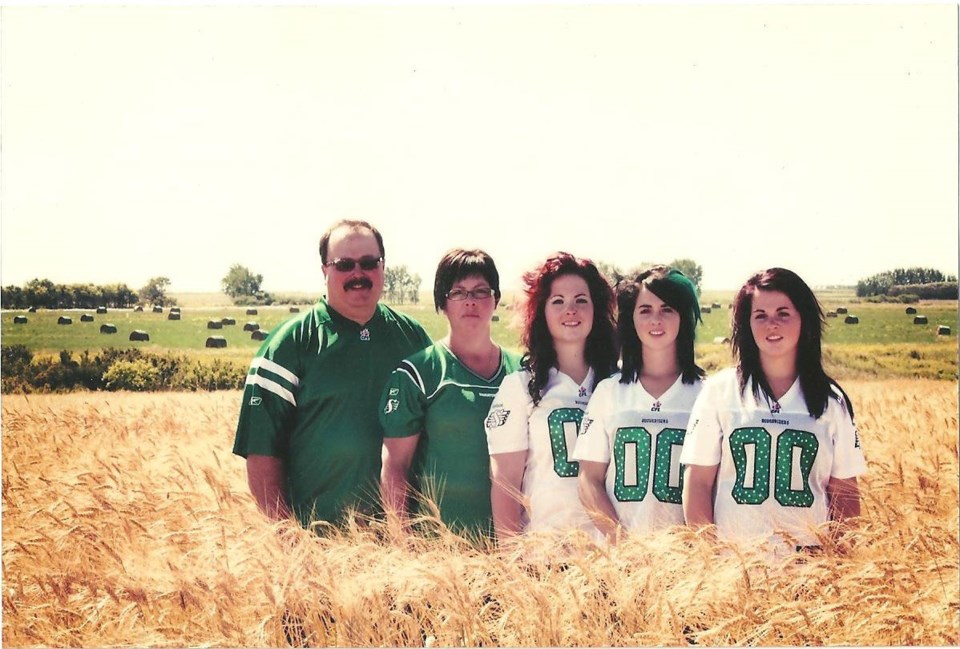Longevity in agriculture is a common trait among the past recipients of the Farm Family of the Year Award.
This year’s recipients are no different, as they have an operation that has succeeded through four generations, and more than 100 years, in the Alameda area.
Dunnigan Family Farm was presented with the award during the Estevan Farmers’ Appreciation Dinner on March 10 at the Beefeater Plaza, in front of more than 300 people. Retired Estevan MLA Doreen Eagles was tasked with reading the family’s biography and presenting them with the award.
Family patriarch William Dunnigan came west as a pioneer in 1882.
“With limited supplies and determination, he dug a hole in the side of the Souris River bank and lived under buffalo hides his first winter,” the biography stated.
William lost his first wife, Ann, in 1891, but he stayed in the area and raised his infant son. Tragedy struck again when he lost his brother Francis, who left behind a widow, Sarah, and four children. Will and Sarah married in 1897 to keep the families together, and they had a son, Wellington, better known as Wally.
They moved around the south Alameda area with their family, until they settled down in a log house in the late 19th century.
“(A) priority for the moves was so the family could be in close proximity for a strong education,” the biography stated. “All of the children went on to receive secondary education even if they were going to farm.”
Wally grew up and married Loretta, and became the second generation to be involved with the farm.
A large, two-story red clay brick house was finished in 1914, and it is still standing today. The Dunnigan farm was hit by a cyclone in 1920, and the only building that was left was the brick house. All four generations of the Dunnigans have occupied that brick house at some time throughout their lives.
“He lived a life with strong morals and had a phrase that he lived by: ‘Do unto others as you would have them do unto you,’” the bio stated.
Wally and Loretta’s oldest son, Allan, carried on with the family farm, and put a heavy emphasis on grain farming, with a substantial pedigreed seed business that shipped seeds throughout Saskatchewan, Manitoba and North Dakota. The first phase of a seed plant was built in 1967, and a second phase was added in 1986.
The fourth generation to be involved with the farm was their son Brent and their daughter, Bonny. Brent’s wife, Peggy, and Bonny’s husband, Glen, have also been part of the operation. The Dunnigans have grown a variety of different crops over the years.
“I can remember driving down the road, and my grandfather said ‘Brent, you are going to be a businessman, you are going to be an entrepreneur,’” Brent recalled. “But as a farmer, you are an entrepreneur every day, and I have huge respect for that.”
The operation has grown significantly over the years, with each generation adding to their land base. They now farm 7,000 and 8,000 acres in the Alameda and Frobisher areas.
Brent noted there was a family member who became a veterinarian in most generations. The Dunnigans have also ventured into sciences, engineering, accounting and administration and put it towards farming.
One of Brent and Peggy’s daughters, Kailey, is working as an office assistant in Carnduff, and has a strong interest in animals.
The fifth generation of the Dunnigan family remains on the farm, and continues to gain experience. Brent and Peggy’s other daughters, Tayler and Shelby, spoke at the Farmer’s Appreciation Evening.
“The farm has always been a place for the three of us to grow with passion, learn from incredible mentors, work as one, and, in all honesty, we’d be all lying if we said the farm wasn’t a place where some controversial arguments could occur,” said Tayler.
“Most importantly, the farm has been somewhere that we generate our love from. Love to our family. Love to our friends who are included in our family operation. Love to the land for blessing us with this opportunity. And love to the intense, dirty and labourious farm work that gives you the incomparable feeling of success and accomplishment.”
Shelby added everything they do stems from following their passion, and working together and with others as a team. And their history has shaped the farm into what it is today.
“Our roots will always continue to remain as one, planted in the soil of Dunnigan Farm,” said Shelby.
Community involvement has been a big part of the family’s success as well, as all generations have been involved with various organizations.
“Agriculture has truly been a passion for our family, passed down from generation to generation,” said Brent.
The success of the Dunnigan Family Farm has not been because of any one individual. Rather, it has been due to working together as a family, communicating with the next generation and adapting to change.




